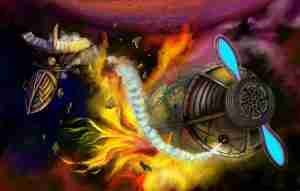Chapter Title: On the Politics of Kicking Ass and Taking Names
This chapter – oh this chapter. I had a very difficult time with this chapter. In the early days of writing the novel, this chapter almost ended the whole effort. I chalk it up to inexperience because now I would have approached it differently.
In this chapter, after God enters from another Bacchanalia, Freud tweaks on crystal meth. Crystal meth is one of those drugs that I’d love to try but fear, so I don’t. I watched many, many documentaries on crystal meth all for just a few lines of text. It was worth it though. What an insane drug.
God talks about prayer during this chapter. He is critical of why some people pray – not all, but some. He doesn’t like it when people reach out only in desperate times. For me, this was kind of personal. Not that I’m critical of people who do this, because I don’t really care. Anymore. I remember being a teenager and praying during certain, desperate times. Reflecting on that is where my criticism originates. I give a sturdy wag of the finger to young Dylan and also why God dislikes the action.
God then says that too many atrocities have been claimed in his name, such as the People’s Crusade in 1095. The reference to Pope Urban II’s speech at Clermont is historical fact. You can read the entire speech HERE if you like. It’s a fantastic piece of rhetoric to study and contains lines like, “From the confines of Jerusalem and the city of Constantinople a horrible tale has gone forth and very frequently has been brought to our ears, namely, that a race from the kingdom of the Persians, an accursed race, a race utterly alienated from God…” and “They circumcise the Christians, and the blood of the circumcision they either spread upon the altars…” and “When they wish to torture people by a base death, they perforate their navels, and dragging forth the extremity of the intestines, bind it to a stake; then with flogging they lead the victim around until the viscera having gushed forth the victim falls prostrate upon the ground…”
Whoa! What?
Approximately 40,000 people went to Constantinople as a result of this speech. Men, women, and children. They wanted to help. But very few of them had any military training and Alexi I (Emperor of Constantinople at the time) couldn’t feed so many people upon their arrival. They were sent on their way towards Jerusalem with very few supplies. Many died from starvation or thirst while the remaining were killed by Muslim soldiers. It wasn’t a well-conceived plan, to say the least. That was the end of the First Crusade, more commonly known as the People’s Crusade.
Following this, there is a fleeting reference to Sodom and Gomorrah which is only used to foreshadow a topic for later discussion. Since that’s the case, I’ll leave it alone until we get to its reemergence.
Then we get to the zealot phone call. This is the part that made me want to stop writing the novel. In fact, I did stop writing for about six months because of this conversation. I hated it the original draft that much. I’m okay with it now (it’s still, by far, not my favorite part of the book) but the original draft was horrible. And this is why I say that inexperience caused me to shelf it. Now, I would hack my way through something like this and not worry about it until editing. While writing, there were at least four separate occasions where I thought about quitting and put the book away for a while. This was the first one.
God talks to Amos, which is a name that I randomly chose from the Bible. God makes fun of him. God tells him to quote some line from the Bible, but he doesn’t know what the passage is. Amos knows what it is, which then becomes a discussion about penis size. This is nothing more than a cheap setup for Freud to get excited about penises, which I imagine really did excite him.
In a notebook, Freud writes that God is a megalomaniac, which I think is hilarious. To call God a megalomaniac… well, what else could he be? There is also a question about an oedipal complex which is both so typically Freudian and another hint at events to come.
The rest of the chapter is more about how the gods work together at the call center. I’m just trying to establish how God gets along with others. Basically, I’m trying to humanize him as much as possible in the first two sections where he makes an appearance. I just can’t imagine a perfect individual, so I’m establishing his flaws, which are human flaws. I wrote him with the premise that if we are created in his image and we are flawed, then God must be ultimately flawed. And with that in mind, the Freudian games are set to begin.
Buy it Now! Amazon Smashwords Barnes and Noble iBooks Kobo






